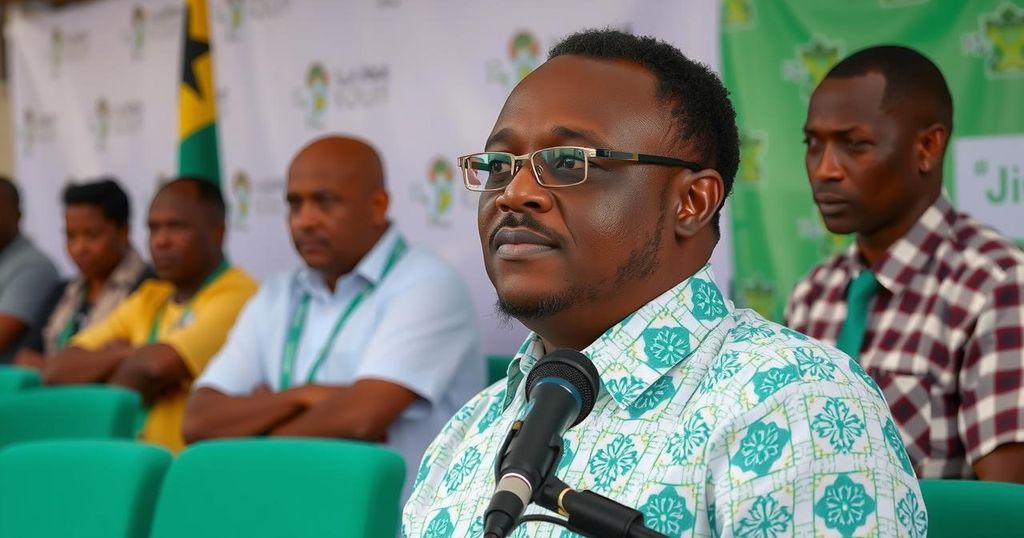World news
AFRICA, AKUFO - ADDO, BAWUMIA, DAKAR, ELECTION, GHANA, GOVERNANCE, GOVERNMENT, JOHN DRAMANI MAHAMA, MAHAMA, MAHAMUDU BAWUMIA, N. D. C, N. P. P, NANA AKUFO - ADDO, NATIONAL DEMOCRATIC CONGRESS, NEW PATRIOTIC PARTY, PRESIDENTIAL ELECTION 2024, SENEGAL, SUCCESSION PLANNING
Amira Khan
0 Comments
Ghana’s Upcoming Presidential Election: A Choice for Economic Recovery
Ghana’s presidential election on December 7 pits former president John Dramani Mahama against Vice President Mahamudu Bawumia amid economic turmoil. With high inflation and poverty rates, young voters are mobilizing for change. Historical stability and a large electoral turnout are expected as citizens seek a leader to address pressing concerns regarding the economy and environmental degradation.
Ghana is set for a pivotal presidential election on December 7, where citizens must choose between a returning former president, John Dramani Mahama of the National Democratic Congress, and the Vice President Mahamudu Bawumia of the ruling New Patriotic Party. Amid rising inflation, increasing poverty, and environmental protests due to illegal mining, Ghanaians are eager for solutions to their economic troubles. Analysts note that the election presents a unique challenge as both candidates hail from northern Ghana, this election could pivotally influence the nation’s direction going forward. Young voters, numbering over 700,000 interpreted as a key demographic, are increasingly engaged in the electoral process, underscoring the youth’s impatience with the current state of affairs.
The political landscape in Ghana is shaped by two major parties that have each dominated since the reemergence of multiparty politics in 1992. President Nana Akufo-Addo’s administration has faced scrutiny due to the economy’s declining health, which has resulted in significant hardships for the populace. Notably, Ghanaians have been engulfed in heightened inflation and unemployment, leading to widespread dissatisfaction with the current administration. While voters may opt to elect Mahama, who seeks redemption for his previous term, Bawumia aims to distance himself from the present administration’s failures while promising innovative solutions.
Young activists have expressed their hopes for a candidate who will prioritize environmental protection and economic revitalization. The anticipation surrounding this election is heightened by Ghana’s historical stability in a region often afflicted by political turmoil. Despite relatively low immediate threats, the specter of security remains pertinent as insurgent elements lurk in neighboring regions. Election day promises high voter turnout due to the discontent felt among the youth and first-time voters eager for change.
Polls will remain open until 5 p.m. on Saturday, with preliminary results expected to be reported on the same night, while official results should be finalized within three days. The elections will determine not only the leadership but could also signify a shift in policy direction necessary for tackling Ghana’s pressing economic grievances.
This election comes at a critical juncture for Ghana, as the citizens weigh their options in a political environment fraught with economic challenges, societal unrest, and a youth demographic that is increasingly vocal about their aspirations for a better future.
Ghana, seen as a beacon of democracy in West Africa, faces significant economic challenges that threaten its stability and growth. Recent years have seen the country struggle with escalating inflation and rising poverty levels as the government attempted to navigate severe fiscal mismanagement. The political scene is primarily dominated by the New Patriotic Party and the National Democratic Congress, both of which have governed the country since the reestablishment of multiparty politics. This election marks a critical moment where voters must determine a leader capable of addressing the pressing issues of the economy and societal discontent, particularly among the youth, who are increasingly engaging in political activism. Ghana has a historic reputation for peace and stability, rendering the election even more significant amid regional turbulence and instability.
The upcoming presidential election in Ghana represents a crucial decision point for its citizens as they grapple with significant economic challenges and rising dissatisfaction. The choice between a seasoned former leader and a vice president who has seen economic failure under his party places immense pressure on voters. Young voters’ engagement signifies a hopeful push for a transformative political direction. As Ghana prepares to cast votes, the outcome may have lasting implications for the country’s future economic landscape and social cohesion.
Original Source: www.nytimes.com




Post Comment